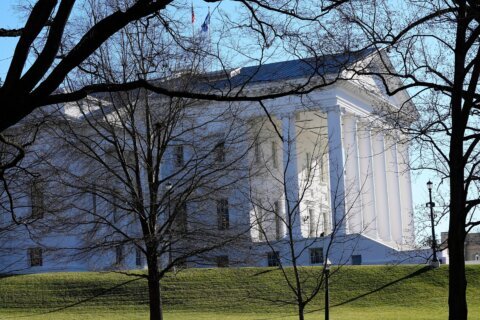The Fairfax County School Board, representing Virginia’s largest school system, says the Commonwealth’s new law prohibiting mask mandates is unconstitutional, and wants to be heard in support of a federal lawsuit filed by the ACLU on behalf of immunocompromised students.
Gov. Glenn Youngkin signed Senate Bill 739 into law on Feb. 16, with an emergency amendment which let the law go into effect immediately.
A federal judge in Charlottesville Monday afternoon will consider whether to allow the Fairfax school board to file an amicus curiae brief in the ACLU suit, which was filed on Feb. 1, and includes students who live in Fairfax and Loudoun counties, among others.
U.S. District Court Judge Norman Moon has been asked by Virginia Attorney General Jason Miyares to dismiss the lawsuit before trial.
In its request to be heard, the school board says it has a direct interest in the matter: “Among FCPS’ students with disabilities are hundreds and hundreds with serious medical conditions that render them at ‘high risk,’ for serious illness or death from respiratory infections such as COVID-19, according to CDC criteria.”
The school board’s motion comes even as COVID conditions improve.
“The masking provisions of SB739 have, to an appreciable degree, been overtaken by events. In the past few weeks, infection rates and hospitalizations from COVID-19, and in particular the omicron variant, have materially trended down in Fairfax County.”
While the need for universal masks continues to decrease, “A broader, more fundamental legal principle is at stake: the responsibility bestowed by the Constitution of Virginia on locally elected school boards to make decisions for the protection of their students’ safety, welfare, and education.”
The motion suggests passing a law that “absolutely and uncategorically prohibits local school boards from even entertaining a type of student safety measure used successfully in the past to prevent student illness,” violates Article 8, Section 7 of the Virginia constitution, which grants a school boards the responsibility of supervising its school division.
In a second argument, the school board contends the bill “was rushed through the General Assembly,” and signed into law with a Youngkin-endorsed emergency clause. Typically, new legislation in Virginia takes effect on July 1.
“The General Assembly subsequently passed the Governor’s recommendation by a bare majority in both houses (21-19 in the Senate, and 52-48 in the House of Delegates), but not anything approaching a four-fifths supermajority,” that FCSB says is required by Virginia’s constitution.
In its previous motion to seek dismissal of the lawsuit, the argument from the attorney general’s office touched on the debate over the effectiveness of cloth masks. “Even if universal mask mandates were an effective mitigation measure, the ADA and Rehabilitation Act require only that some reasonable accommodation be made, not the particular accommodation that a plaintiff prefers,” wrote Solicitor General Andrew Ferguson.
Ferguson wrote schools could provide immunocompromised students “with high-quality N95 or KN95 masks, which protect the wearer regardless of whether others are masked.” Other measures could include improving ventilation in affected classrooms, requiring masks for teachers and staff or providing remote learning options.
The motion seeking dismissal of the suit said plaintiffs hadn’t demonstrated they’ve been harmed by the elimination of the mask mandate: “A plaintiff must demonstrate more than just a ‘possibility’ of irreparable harm,” according to Ferguson.








